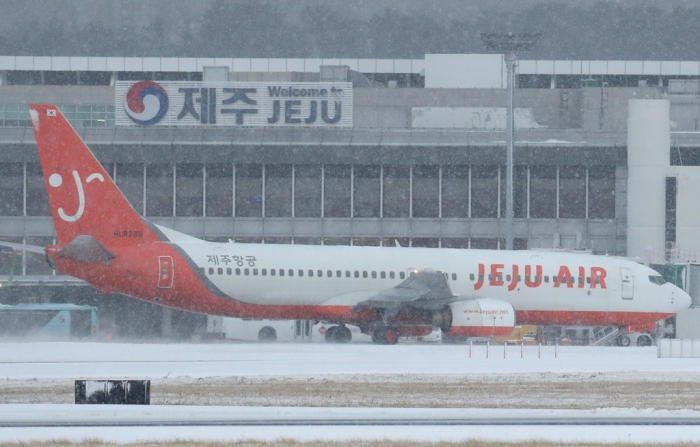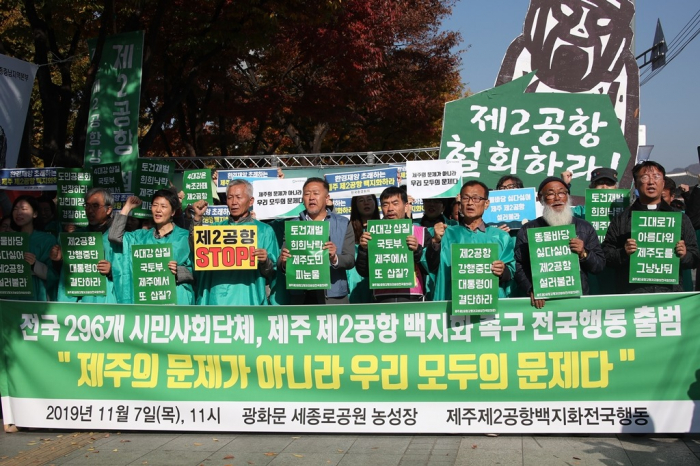Business & Politics
Korea clears environmental hurdle for new Jeju airport
The environment ministry conditionally approves the project, but the plan needs the residents' consent amid doubts over economics
By Mar 07, 2023 (Gmt+09:00)
4
Min read
Most Read
LG Chem to sell water filter business to Glenwood PE for $692 million


Kyobo Life poised to buy Japan’s SBI Group-owned savings bank


KT&G eyes overseas M&A after rejecting activist fund's offer


StockX in merger talks with Naver’s online reseller Kream


Mirae Asset to be named Korea Post’s core real estate fund operator



South Korea’s environment ministry conditionally approved the construction of a new airport on Jeju Island with a 6.7 trillion won ($5.2 billion) investment, clearing a key hurdle for another gateway to the country’s top tourist spot, although the project still needs consent from residents amid controversy over its economics.
The Ministry of Environment said on Monday it has consented to a strategic environmental impact assessment on the second airport for the island submitted by the Ministry of Land, Infrastructure and Transport. The environment ministry, however, required conditions such as measures to protect endangered species, prevent bird collisions and minimize aircraft noise.
The approval came after about eight years since the country announced a plan to build a new airport with runways 3.2 kilometers long and 60 meters wide on a 5.5 million-square-meter site in Seogwipo, the eastern end of the island.
The land ministry has been pushing for the project unveiled in November 2015, saying Jeju International Airport, the island’s only airfield, was running at overcapacity and flights were frequently canceled due to bad weather. South Korean President Yoon Suk-yeol also pledged the new airport when he ran for the election.
The project unveiled in November 2015 was delayed as the environment ministry requested measures be put in place to solve deficiencies.
NOT YET CLEAR FOR TAKEOFF
The land ministry plans to proceed with follow-up steps including the public announcement of a basic plan for the new airport as the environment ministry approved the project.
“We have been waiting for clearance by the environment ministry while completing the research for establishing the basic plan for the second airport,” said a land ministry official. “We plan to unveil the basic plan as soon as possible by proceeding with follow-up measures.”
The plan is unlikely to be as smooth as the ministry hoped, industry sources said. It may take months to unveil the basic plan, they added. The ministry spent four months before the recent announcement in talks with the environment ministry and municipal authorities.
Even with the announcement of the basic plan for the new Jeju airport, other hurdles are expected before breaking ground. The project needs to get separate environmental approval from the island’s government, which needs consent from the provincial council, in the design stage.
The environmental ministry’s approval is expected to intensify conflict surrounding the new airport with the island’s residents already divided over the project.
“The environment ministry is a minion of the land ministry, a vanguard of the destruction of the land,” said a civil group against the project.
On the other hand, a Jeju government official predicted the project with fiscal spending of more than 6 trillion won to create jobs, stressing “it will revitalize the economy in Jeju.”
The majority of Jeju residents opposed the project, although most inhabitants at the site of the new airport supported it, according to a local media survey published in February 2021.

ECONOMICS
The project is expected to provide 50,441 jobs with estimated production-inducing effects of 5.3 trillion won and value-added creation effects of 2.4 trillion won, according to the land ministry’s research for the basic plan.
The new airport planned to handle 16.9 million passengers in the first phase by 2035 and 19.9 million customers in the second by 2055.
In the first phase, the airport was scheduled to focus only on domestic flights to the island with the existing airfield handling all the international routes and 50% of domestic ones. In the second phase, the new airport will handle 47.8% of domestic flights and 56.7% of international services while the old one will take care of 52.2% of domestic flights and 43.3% of international routes.
The new airport had been assessed as significantly economical with the benefit-cost ratio (BCR) at 10.6 in the land ministry’s initial feasibility study. If a project has a BCR greater than 1, the project is expected to deliver a positive net present value.
The BCR for the new airport, however, dropped as time went by. The indicator nosedived to 1.2 in a preliminary feasibility study by the Korea Development Institute (KDI) in 2018, while the figure fell further to slightly above the threshold in the land ministry’s analysis in 2019. The project cost also increased.
The land ministry was suspected of intentionally omitting the research by Groupe ADP, an international airport operator based in Paris, which said the existing airport is enough to meet demand from operating flights with excellent management.
Jeju International Airport is among the few airports that generate a profit in South Korea along with the country’s largest Incheon International Airport.
Some experts said a new airport on the island will disperse passengers, making it difficult for both airports to be profitable.
Write to Yong-Hee Kwak and Ohsang Yoo at kyh@hankyung.com
Jongwoo Cheon edited this article.
More to Read
-
 Business & PoliticsTrump Jr. meets Korean business chiefs in back-to-back sessions
Business & PoliticsTrump Jr. meets Korean business chiefs in back-to-back sessionsApr 30, 2025 (Gmt+09:00)
-
 Korean chipmakersSamsung in talks to supply customized HBM4 to Nvidia, Broadcom, Google
Korean chipmakersSamsung in talks to supply customized HBM4 to Nvidia, Broadcom, GoogleApr 30, 2025 (Gmt+09:00)
-
 EnergyLS Cable breaks ground on $681 mn underwater cable plant in Chesapeake
EnergyLS Cable breaks ground on $681 mn underwater cable plant in ChesapeakeApr 29, 2025 (Gmt+09:00)
-
 Business & PoliticsUS tariffs add risk premium to dollar assets: Maurice Obstfeld
Business & PoliticsUS tariffs add risk premium to dollar assets: Maurice ObstfeldApr 29, 2025 (Gmt+09:00)
-

Comment 0
LOG IN


